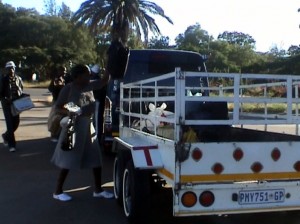Gone to Egoli: Economic survival strategies in Matabeleland
There is not much likelihood that the formal economy in Zimbabwe will recover any time soon. It is likely to take over a decade before industry begins to recover in any meaningful way, and in the interim, Zimbabwe will continue to lose her youth to the diaspora, and those left behind will struggle to survive. Particularly in rural areas, grinding poverty is likely to be a factor for the indefinite future.
Diasporisation is escalating exponentially, with our sample families reporting a one hundred fold increase in the rate at which family members are leaving, between 1990 and 2009. However, there is not proving to be a corresponding return in remittances for rural families in Matabeleland.
While 59% of Zimbabweans in the diaspora are under the age of 30, only 4% of these send goods or money home on a regular basis – three times a year or more. Goods and money sent home do not lift families out of desperate poverty. 76% of families with members in the diaspora received NO money at all in 2008, and many of the remaining 34% received less than R100 a month. Goods sent home could amount to as little as 2 kg of sugar. When asked to describe the impact of having family members abroad, only 20% spoke of remittances. Most people referred to death, disease, criminal habits, broken marriages and diaspora orphans.
Families have been driven to bartering in the almost total absence of foreign exchange and goods for sale in rural areas. This has been ruthlessly exploited by the unscrupulous and at the end of last year, people in some parts of Matabeleland had to barter cows for 50kg maize meal each. Urban families have also resorted to barter as poverty overwhelms them.
The prospects are bleak for Zimbabwe’s poorest citizens, and for the nation’s youth. The next few years are unlikely to see the massive growth nationally that is needed to create the jobs that could
change this reality. What is more likely, is that Zimbabweans will continue to stream across the borders – to be confronted in turn with the hardship of life on the streets in South Africa. Zimbabwe’s poor are getting poorer, and the degree to which remittances from abroad can mitigate against this, has been overestimated when judged against the findings of this study.










![In Hopley Farm, Harare, 8,500 adults live in makeshift housing: out of 2,000 school age children, 75% are out of formal school. [July 2010] In Hopley Farm, Harare, 8,500 adults live in makeshift housing: out of 2,000 school age children, 75% are out of formal school. [July 2010]](http://solidaritypeacetrust.org/wp-content/gallery/a-fractured-nation/thumbs/thumbs_image063.jpg)


